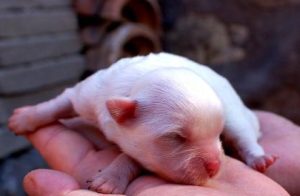In most cases, newborn puppies are cared for by their mother. However, when circumstances require human intervention, it’s crucial to know how to properly care for them.
Puppies instinctively seek. In litters with many puppies, some may not get enough to eat. Keep an eye on their growth to ensure all are developing properly.
After each feeding, gently stimulate each puppy’s genital area with a warm, damp cloth or paper towel to encourage urination and defecation. This is something the mother dog would normally do. Proper bowel movements are essential for the puppy’s health and comfort.
If the mother’s milk is insufficient or she is unable to nurse the puppies, you’ll need to feed them yourself. This entails using a milk replacer and feeding them every two hours around the clock. This requires a significant time and labor commitment.
Feed puppies using a bottle designed for them, and do so in a warm environment. Keep the bottle at a 45 – degree angle to prevent air inhalation, which can lead to bloating. Feed slowly to avoid choking, as puppies can easily aspirate.
Newborn puppies need to be kept warm. Their environment should be maintained at around 85 – 90°F for the first week, decreasing by 5°F each week. Use heating pads or heat lamps with caution, always providing a way for the puppies to move away from the heat source if they get too warm.
Regularly check the puppies’ body temperature. A normal rectal temperature for newborn puppies is around 94 – 97°F. If it’s too low or too high, seek veterinary assistance promptly.
Monitor the puppies’ weight gain. Healthy puppies should gain weight consistently. If you notice any weight loss or other abnormalities, consult a vet immediately.
If the mother dog is caring for her puppies, ensure she receives proper nutrition and veterinary care. She needs a diet rich in protein, fat, and calories to support milk production and her own health.
Human assistance in caring for puppies before weaning can be crucial in ensuring their survival and healthy development. With proper care and attention, these vulnerable little ones can grow into strong, happy dogs.

